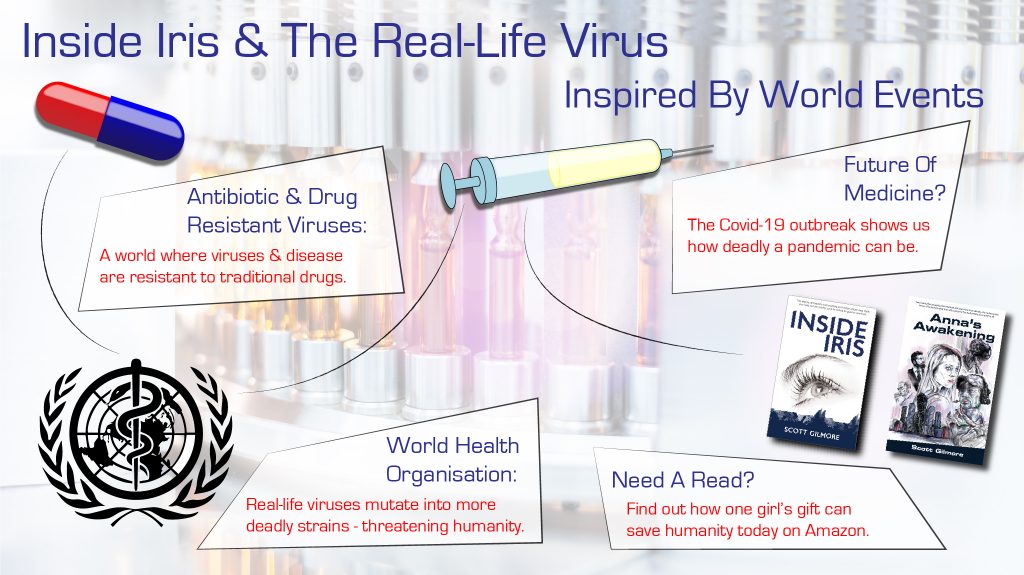As a UK fiction writer, author & blogger, I understand the importance of research. By learning from the real world, here’s how I developed the world of Inside Iris.
In this UK Fiction Writer blog article, you will find information on:
- Sci fi hooks many of us from a young age, it ripens our imaginations and helps our inspiration with telling stories,
- Real-life issues, like antibiotic dependence, inspired the IRIS Trilogy, borrow real issues from around you as readers can identify with them,
- Existing organisations and bodies like the World Health Organisation are great to research as they give you real cases to research, meaning you don’t have to make it up yourself,
- The future of medicine and technology is vibrant and gives you a lot of ideas for your next novel, so explore and adapt them for your work.
Read the rest of the UK Fiction Writer blog article to learn how real-life circumstances inspire sci-fi today.
UK Fiction Writer: Hooked From A Young Age
As a UK fiction writer, author & blogger, I understand the importance of research. By learning from the real world, I developed the world of Inside Iris into a setting that ranked at number 3 in a UK Kindle Store chart. When writing Kindle sci-fi books, we need to shape a world that melds science and fiction together in a believable fashion. This is what I wanted to do with the world within Inside Iris and Hexingham.
As the BBC News and Sky News report on the spread of the coronavirus across China, the world that I describe in Inside Iris is one that has always fascinated me. I have always remembered movies like Outbreak (1995), where we see how disastrous the spread of a pandemic can be with the use of air travel and global trade making the world ‘a smaller place’.
When I was younger, I was a massive gamer. Games like Resident Evil hooked me in as the developers used the T-Virus to link the idea of zombies into their game storyline. As a teenager, I was completely taken in by this series of games and the storyline they told.
In recent times, games like Plague Inc. have sold millions of copies worldwide. In this game, you can become a virus and try to wipe out the human race by mutating and evolving to become a lethal killer.
Now that we have a current news story breaking in China and across the world, I wanted to share how I decided to go about planning my setting and the dystopian world within Inside Iris. I want to share how, as a UK fiction writer writing Kindle sci-fi books, I try to use real-life science around us to shape the stories I tell.

Click on the image to see the fiction books I have released so far. Both Inside Iris and Anna’s Awakening are available for purchase on Kindle and paperback from Amazon.
Antibiotic Dependence
As I’m sure many of you are aware, the NHS in the UK run a programme to educate patients about how we need to limit the use of antibiotics. With a series of posters, leaflets, and TV advertisements, it’s hard to miss the message the National Health Service is trying to get across to everyone in the country – only use antibiotics when you need them.
Realistically, we all want to ensure that drugs work as expected when we get them, and this is a programme that I agree with. However, as the UK and the NHS are not the only people with the power to serve up antibiotics to patients or indeed animals, what can we do when other countries don’t have such stringent rules?
Also, if we look at influenza that comes from animals, like bird or swine flu, there is an added element of danger. How can we fight flu that is transmitted from animals when we have little experience fighting those particular viruses as humans?
The World Health Organisation
When researching Inside Iris and the modern dystopia within it, I wanted to look at the World Health Organisation to see whether there were any viruses they were worried about. This site was excellent, and I loved scrolling through the various pages and learning information about a topic that I was interested in, but had little experience of.
I wanted to look up as many reader-friendly articles that I could in relation to various emergencies or cases of outbreaks that I could. I also wanted to learn about amazing doctors who dedicate their lives to helping fight the diseases that threaten the existence of our species.
This is where I developed the character of Dr Rosen in Inside Iris. I wanted to have a man who was extremely dedicated to the career he chose but became incredibly conflicted about the ethics of what he and The Institute were doing to such a young girl.
By researching this website, and the real people who were mentioned within their articles, I was able to develop viruses and characters who I felt added to the story I wanted to tell.

The Future Of Medicine?
I know that within Inside Iris, the dramatic fictional element of having The Institute experiment on the population may be much further towards the realms of fiction than science. However, governments and regimes have experimented on people for medical purposes.
In the past, surgeons have paid grave robbers to exhume the bodies of the dead from graveyards, and totalitarian dictators or regimes have conducted tests on ‘lesser races’ of people. There is no doubt that, in the past, we have gone down that route.
In the present and the future, I wanted to toy with that idea again. I posed the question if the human race had an option to avoid extinction, would the world leaders exploit it to ensure the survival of the human race?
This is the question at the centre of the Iris trilogy and is introduced in my debut novel, Inside Iris.
Whether or not you feel world leaders could agree to such an approach is a different matter. However, many areas of science fiction have been seen as ludicrous until scientific advancements made them a reality. Could this be the same when the future of the human race is at stake?
Only time will tell.
When I write my creative writing blogs, I want them to be a source or information for people who are writing their own Kindle fiction books, paperback novels, and starting as a writer in general. I love hearing from people who email me and ask to reference my blogs within their own.
If you read one of my blogs and want to link to it as a reference material, please email at scott@sgfiction.co.uk. Let me know what your project is and how you will use my content. If it sounds good, then I would love for you to link to my articles within your own – don’t reinvent the wheel people!
I hope to make 2020 an incredibly successful year as a creative writing blogger and a UK fiction writer. Please keep supporting indie and self-published authors by buying Kindle fiction books and paperback novels. Once you read them, make sure to leave a review to share your thoughts.
Thank you all for your fantastic support throughout 2019 and into 2020.


